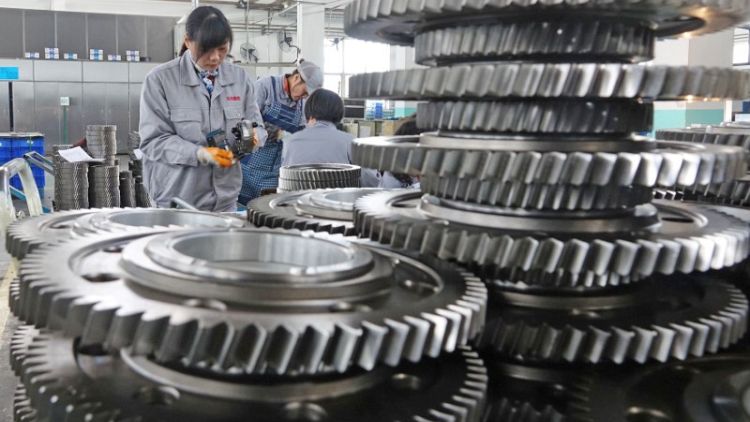BEIJING (Reuters) - China's manufacturing sector is expected to have contracted for the first time in more than two years in December, reinforcing a deteriorating economic outlook and the need for more policy support to weather rising external and domestic pressures.
China's official manufacturing Purchasing Manager's Index (PMI) for December is forecast to slip to 49.9, according to the median forecast of 27 economists in a Reuters poll, below the critical 50 level that separates growth from contraction.
A contraction in December, which will be the first since July 2016, would signal a continued loss of economic momentum and raises the risks to both China and the global economy, especially if a Sino-U.S. trade dispute drags on.
Already, there are signs the trade frictions between the economic giants are rippling through global supply chains. The fear is that the effects could become more pronounced next year in a blow to world trade and investment.
Chinese authorities are expected to roll out more supportive measures on top of a range of policy initiatives this year. A prolonged downturn in the factory sector, key for jobs and the overall health of the economy, would likely draw further steps to juice up domestic demand.
"Such measures - mostly medium to long-term policies - are likely to put a floor under the slowing economy in the second half of next year at the earliest," said Nie Wen, economist at Hwabao Trust in Shanghai, noting that with global demand slackening, the policy effects could be further delayed.
There is also uncertainty whether China and the United States can bridge their differences during a temporary ceasefire in their trade war.
At the beginning of this month, U.S. President Donald Trump and Chinese President Xi Jinping agreed to a 90-day ceasefire that delayed the planned Jan. 1 U.S. increase of tariffs on $200 billion worth of Chinese goods while they negotiate a trade deal.
Analysts expect China's export growth would come under pressure at the end of the truce period as the boost from cargo front-loading tails off and the drag from cooling global demand intensifies.
A private survey - the Caixin/Markit Manufacturing Purchasing Managers' index (PMI) - which focuses more on small and medium-sized Chinese firms - is expected to show only marginal growth in December, falling to 50.1 from 50.2 in the previous month.
POLICY SUPPORT
China's economy has been slowing this year as a multi-year government crackdown on shadow lending put increasing financial strains on companies and dent production and investment.
Data earlier this month showed surprising softness in November's factory output and retail sales. China also reported far weaker-than-expected November exports and imports, reflecting the slowdown in global demand.
The government has in recent months unveiled a slew of policy measures, including cuts in banks' reserve requirement ratio (RRR) to boost lending, tax cuts and steps to fast-track infrastructure projects.
Beijing has particularly focused its attention on small firms and private enterprises, which are vital for economic growth and employment, as tight liquidity conditions and trade frictions further dim their outlook. More policy support is expected in coming months.
"We expect a total of 250 basis points of RRR cuts in 2019, with 100 bps RRR cut likely ahead of the lunar new year starting on Feb. 5," Nomura economists wrote in a note.
The World Bank this month predicted China's economic growth to slow to 6.2 percent in 2019 from an expected 6.5 percent this year.
The official PMI survey is due out on Dec. 31, along with a sister survey on services. The Caixin manufacturing PMI will come out on Jan. 2 and its services PMI on Jan. 4.
(Reporting by Lusha Zhang and Ryan Woo; Editing by Shri Navaratnam)



